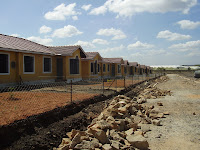Eastern Africa coast: An emerging fossil fuels giant

An oil rig. These monsters discover oil from the earth's bowels THE ENTIRE EASTERN Africa coast is emerging as a fossil fuels giant. A flurry of finds of commercially viable deposits of oil and natural gas has spawned intense activity in exploration of these resources. In the last decade or so, commercially viable oil deposits were found in South Sudan and Uganda. Natural gas has been found in Tanzania while in Kenya an oil find announced this week, is awaiting commercial verification. There are reports of viable oil deposits in lawless Somalia. Since it takes about three years or so to verify commercial viability, the implication here is by 2016/17, this region of an estimated population of 200 million people will be a major player in the world’s energy market. An exploration mapping high potential areas in Kenya, indicates that eastern Africa could rival some middle east oil producers. The frequent discoveries raise confidence on the potential of the region’s f...


